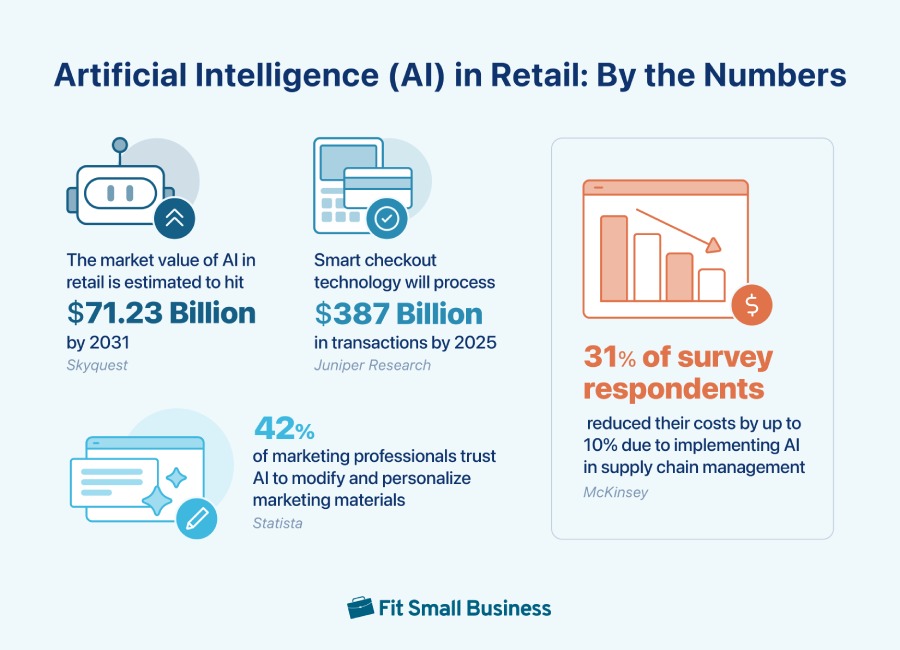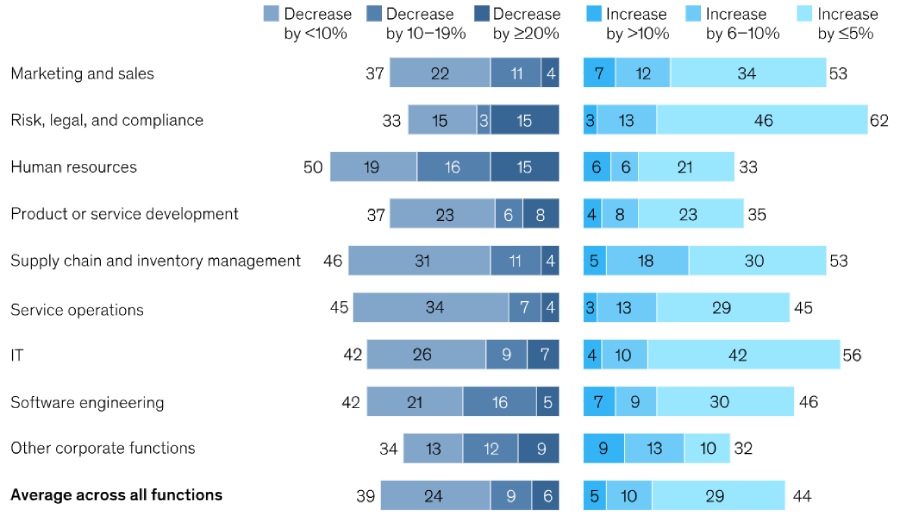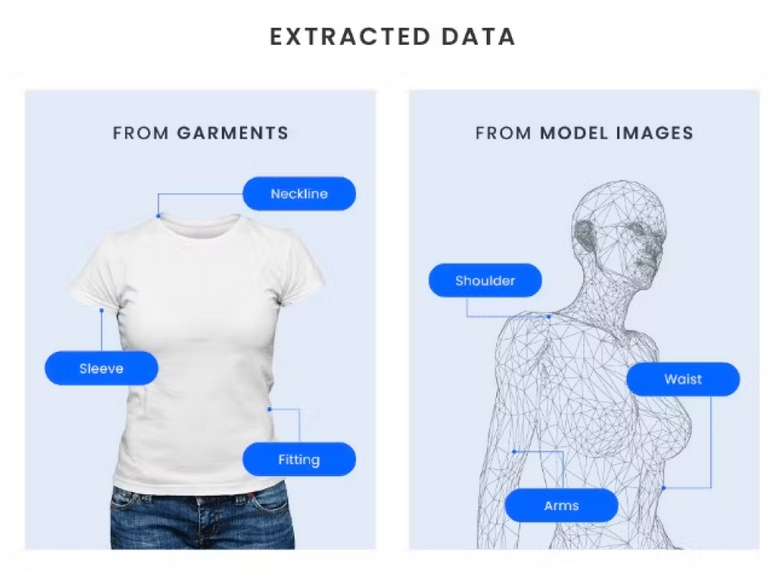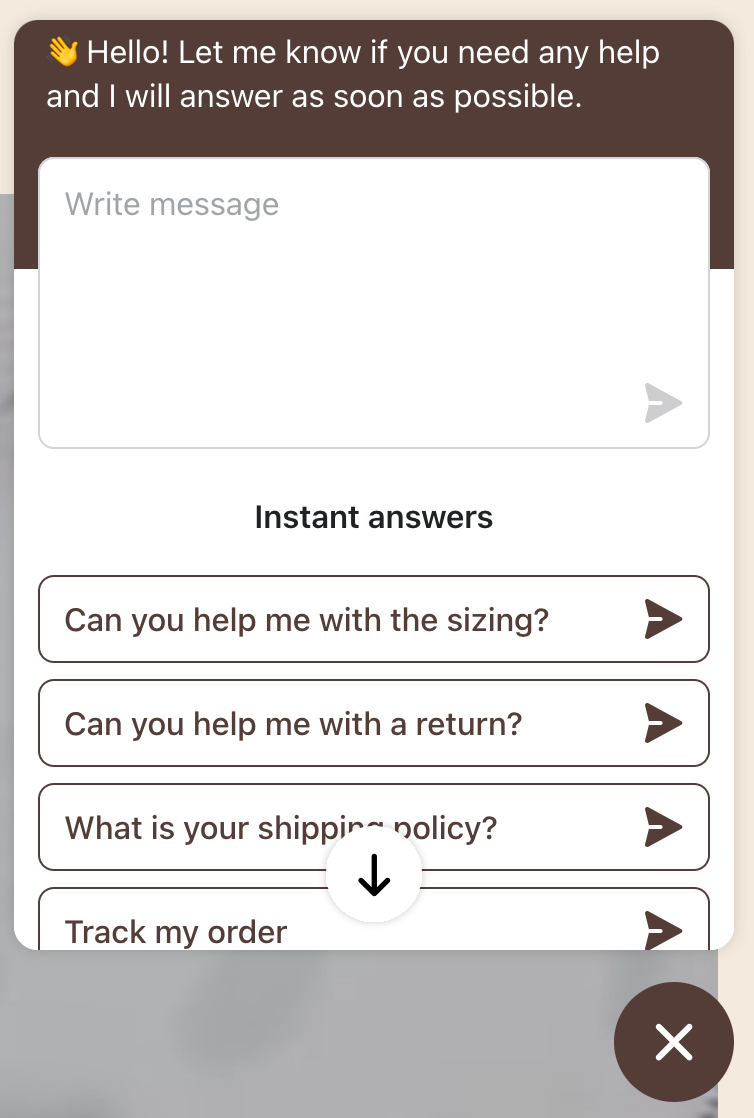Artificial intelligence (AI) is technology that employs machine learning and automation to make decisions and solve problems like a human would.
This technology is more common than ever in the retail landscape, with online chatbots, AI-driven inventory and vendor management, and marketing materials and shopping experiences personalized by the technology. The AI wave won’t be stopping anytime soon; if retail businesses want to stay competitive, they will have to embrace the reality of AI-augmented operations and put it to more effective use than their competitors do.
Key Takeaways:
- More and more retail businesses are using artificial intelligence to manage their key business processes more efficiently.
- You can employ AI to optimize your inventory, change your store layout, create or edit product recommendations, manage staff, and more.
- Effective use of AI reduces costs, improves profits, personalizes customer experiences, reduces loss, and boosts sustainability.

Ways to Use AI in Retail
You may be asking if you should use AI in your retail business. Generally, the answer is yes, you should use AI. Retail businesses of all sizes can leverage the power of AI and machine learning in day-to-day operations—and, as mentioned above, many already do. If you use automated reordering or even Facebook dynamic ads, for example, you already use AI in your business.
You can apply artificial intelligence-powered tools to key business processes including:
- Streamlining your supply chain to reduce costs and improve profits
- Changing up your store layout to maximize appeal to customers
- Analyzing and predicting foot traffic and buyer demographics
- Personalizing marketing and product recommendations to improve buyer experience
- Cross-selling and upselling to boost profits
- Managing staff shifts and schedules
- Managing, forecasting, and purchasing inventory
Let’s explore these points in depth.
Supply Chain Management
According to a 2024 McKinsey & Company report, 31% of respondents in 2023 experienced a cost reduction of up to about 10% due to the adoption of AI in their supply chain management. Additionally, 48% of respondents reported a revenue increase of up to 10% because of AI.

AI offers the potential for measurable costs, savings, and revenue improvements in various areas of business. (Source: McKinsey)
Because supply chain management touches so many areas of the business, there are many ways you can use AI. You might rely on ordering and routing automations, or use AI in analytics reporting to see which suppliers are high performers and which ones could use improvement.
Store Layout & Merchandising Optimization
Planning your store layout and then optimizing it for the best customer experience and most sales is an important task for everyone starting a retail business. AI can help in that aspect. Rather than simply relying on intuition or your own strategies, you can take a data-informed approach to your retail store design and setup.
For example, foot traffic counters and analytics platforms monitor not only how many people enter your shop but also where and how they move around within it. Placer.ai, which we include in our guide to determining foot traffic, is one example of such a tool, but many out there also use predictive analytics to help you plan your layout and identify upselling opportunities. Some point-of-sale systems such as KORONA POS include reporting tools that analyze foot traffic.
Related:
Personalized Product Recommendations
Artificial intelligence can take the data inputs about what your customers buy, how much they spend, and related information, and then predict future behavior. In 2022, marketing professionals worldwide cited “predicting customer behavior and needs” as their top reason for using AI, in the context of improving the customer experience.
AI will identify patterns and automatically adapt to those patterns to provide personalized and data-driven product recommendations for cross-selling and upselling—two techniques to help increase your average transaction amount.

AI can help you send hyper-personalized messages or offers based on your customer data. (Source: Symphony RetailAI)
This is also helpful in a retail environment because you can equip your associates with mobile tools to help them aid customers in their shopping journey. Plus, your staff can make smart product recommendations at checkout in an attempt to upsell at the last minute.
Staffing & Scheduling
Setting an effective staff schedule is important. You want to ensure you always have enough personnel to maintain the store and help customers, but you don’t want to overstaff to the point where employees have nothing to do or, worse, you’re losing money.
Predictive analytics and AI can help optimize employee scheduling and take some of the tedious manual processes out of it. When you look for powerful retail scheduling software, identify options that leverage AI technology.
The scheduling software Humanity, for example, has two AI features: Auto-Fill Schedule and Location-Based Break Rules. The former allows retailers to quickly assign shifts and fill empty slots using custom-built rules to avoid scheduling conflicts. The latter automatically adds breaks to shifts while maintaining compliance with state-mandated labor regulations. Find out more about the platform and its offerings in our in-depth Humanity review.
Related:
- Best Employee Scheduling Software for Small Businesses
- Free Employee Schedule Templates & Instructions
- Predictive Scheduling Laws: What You Need to Know
Inventory Management
Inventory management is another area of retail business in which AI has come into play. There are many use cases for AI when it comes to inventory management, ranging from integrations with other platforms to robots that stock shelves—and everything in between. Some of the best inventory management software also have AI features for low stock alerts, transportation planning, pricing discrepancies, and automated reordering. These features help retailers avoid various inventory-related problems such as the bullwhip effect.
Forecasting & Purchasing
On the note of inventory management, AI is also helpful for improving the accuracy of a retailer’s forecasting and purchasing. Supply chain forecasting driven by artificial intelligence was shown to reduce lost sales and product unavailability by up to 65%. More accurate demand forecasting leads to improved purchasing, so you can maintain optimal inventory levels.
Self-checkout & Loss Prevention
Retailers are constantly improving the checkout experience both for the customer and for loss prevention. AI in self-checkout monitors shopper activity and alerts staff to cases of suspected theft. A 2022 report showed that 96% of grocery business respondents deployed self-checkout technology, along with 77% of non-grocery businesses. Survey respondents came from retailers in Europe, North America, and the Australasian region.
Marketing
AI is also prevalent in retail marketing, especially as it relates to automation. In the US and other countries, 42% of marketing professionals trust AI to modify and personalize marketing material. Marketing automation includes email sequences, social media advertising optimization, customer segmentation, and even personalized promotions and campaigns, among many other things.
Related:
You can also use AI tools like ChatGPT to help you write copy. This is especially helpful if you don’t consider yourself a writer or marketer. You can prompt the AI writing tool to write social media captions, headlines, email subject lines, product descriptions, and more. Some editing is almost always required, but it’s a great way to get started with a blank page.
Virtual Fitting Rooms
Virtual fitting rooms are creating a footprint in the retail landscape as more and more businesses adopt the technology. Many of these platforms include some sort of AI technology. This technology tracks user behavior, notes which products customers like, and makes predictions and recommendations based on those data inputs.

AI machine learning systems can create images of products and show how they would look on different body types. (Source: Vue.ai)
Real-life Examples of AI in Retail Stores
You don’t need to be a massive retail chain to implement AI for your business. Check out the following examples of artificial intelligence in retail to get inspiration for your own business.
Benefits of AI for Retail
AI has many potential benefits for retail businesses, including but not limited to:
Sustainability
AI technology can help businesses operate more sustainably in a number of ways, including:
- Monitoring, controlling, and optimizing energy consumption levels
- Accurately forecast demand for products to eliminate expired inventory and waste
- Reduce emissions through automated supply chain optimization
Cost Efficiency
Optimized inventory levels reduce carrying costs. AI reduces the need for costly human labor and allows people to focus on more impactful tasks. On top of that, automation improves accuracy while mitigating costly errors.
It also provides a rich amount of data that businesses can use to make better, more informed decisions—with less financial risk. These are just a few of the ways AI helps retail businesses become more cost-efficient in their operations.
Customer Satisfaction
AI also automates and impacts a lot of customer-facing interactions. Marketing campaigns, automated email sequences, personalized ads, and customer service—these all stand to benefit from AI, and when the customer wins, so does your business.
Related:
AI can also provide solutions quicker, especially during times when a human isn’t available. It can personalize communications and offers automatically, so your customers feel like you’ve taken the time to get to know them and share relevant promotions. You can speed up the checkout process, reducing friction and frustration.
AI in Retail Software & Tools
It’s easier and more affordable to get started with AI than you might think. If you want to use AI in your retail business, simply adopt some tools and technologies that incorporate AI into their platforms.
Customer service software Zendesk and accounting tool Botkeeper are two examples of great retail platforms that take advantage of the benefits of AI. Learn more about Zendesk in our Zendesk review.
Here are some more places to start your research:
- Best Sales Automation Software
- How Artificial Intelligence Improves Customer Service
- Best AI Content Writers for Small Businesses
- Ways to Use AI in Small Business Marketing
You can also learn more about evolving technologies and trends for retail in general:
AI in Retail Frequently Asked Questions (FAQ)
Click through the sections below to learn more about how and why AI is used in retail, and what the future of the technology might be.
The uses of AI include streamlining your supply chain and inventory management, optimizing store layout, personalizing marketing and product recommendations, forecasting demand, and providing a better customer experience.
Business tools powered by artificial intelligence can help you forecast demand and plan purchase orders, increase efficiency and reduce inventory costs, create rich and actionable reports, and give your customers a more personalized experience.
Most business types can use artificial intelligence for at least some of their operations or activities. Businesses in both the retail and restaurant industries have successfully used AI to make their operations run more smoothly and make customers happier.
Bottom Line
AI has been active in the retail landscape for many years, and its prevalence is only growing in many facets of business—from inventory and staff management to bespoke marketing and buyer experiences. Many tools used by small retail businesses, such as POS systems, already incorporate AI in some of their features. Implementing AI into your retail business isn’t as complicated as it sounds. With so many business tools utilizing the technology, it’s accessible to merchants of all sizes and stages of business.

